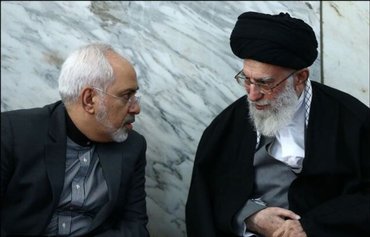The Iranian regime is facing a rising tide of public anger over the ramifications of the actions and decisions of the Islamic Revolutionary Guard Corps (IRGC).
Iran's deepening economic crisis and the growing international isolation the country is facing can be tied directly to the IRGC's support of proxy militias abroad and its prioritisation of exporting its "revolution" over the well-being of Iranian citizens.
The regime's ongoing violations of the international nuclear accord, combined with the IRGC's expansionist agenda, have resulted in a slew of biting sanctions that are costing Iranian civilians dearly.
Approximately half of Iranians are experiencing "absolute poverty", defined as an income equivalent to approximately $266 per month, based on figures from several reports published by Iranian public and private organisations.
![Average Iranians are barely able to afford 25 grammes of red meat per month, according to data from various reports. Red meat is a traditional staple of Iranian tables. [Tasnim News]](/cnmi_am/images/2021/05/20/29878-Iran-inflation-meat-600_384.jpg)
Average Iranians are barely able to afford 25 grammes of red meat per month, according to data from various reports. Red meat is a traditional staple of Iranian tables. [Tasnim News]
Amid skyrocketing inflation that has exceeded 30% a year between 2018 and 2020, it now costs $3.60 to $6.60 a day to feed a family of four -- and that is only if they abstain from all but the basic staples, such as cheese and bread.
Even bread has seen its price rise drastically in the past period -- up to 50% more -- as well as oil and sugar.
Meat consumption is down 60-fold over the past two decades, while the consumption of rice, considered the primary staple of the Iranian diet, has fallen more than 30-fold during that period.
Average Iranians are barely able to afford 25 grammes of red meat, another staple of Iranian tables, per month, according to recent data from domestic media outlets.
Misplaced priorities
Instead of shoring up Iran's faltering economy, however, the regime has chosen to spend its dwindling resources on the IRGC and its regional proxies, including the Lebanese Hizbullah, Iraqi militias and the Houthis (Ansarallah) in Yemen.
A recently leaked audio of a controversial interview with Iranian Foreign Minister Javad Zarif provides further proof of the regime's misplaced priorities.
In the interview with Zarif, which was leaked and widely published on April 25, the foreign minister admitted to the outsized role of the IRGC, its Quds Force (IRGC-QF) in particular, in Iran's foreign policy.
The Islamic Republic prioritises its regional presence and expansionist policies over diplomacy, Zarif repeatedly stressed in the interview.
These policies, designed and decided by slain IRGC-QF commander Qassem Soleimani, constantly prevailed over diplomacy during Soleimani's tenure, he said.
Soleimani would not compromise for diplomacy, even if the IRGC's stances were damaging to Iran's foreign policy "by 200%", he said.
The IRGC's support of militant groups comes at a hefty price.
Estimates of Iran's military and economic spending in Syria range from $30 billion to $105 billion in the first seven years of the war, according to an Atlantic Council report published in February 2020.
Iran has spent up to $16 billion per year on its proxies in the last decade -- roughly 4% of its GDP, the US government estimates.
That may not seem like much money for a country with an annual GDP exceeding $400 billion, but that money could have improved Iranians' lives, said US-based journalist Shahin Mohammadi.
Iran's education, healthcare and welfare programmes are all underfunded, he noted.
Growing protests
The economic instability, along with Iran's political isolation in the region and in the broader international community, has sparked large-scale protests.
On May 1, International Workers' Day, retired government employees in 20 major Iranian cities took to the streets to protest the government's failure to raise their pensions to keep pace with rising inflation rates.
In protests that have been ongoing since early January, demonstrators have chanted slogans against the regime, accusing it of lies and deception.
In January 2020, after the IRGC accidentally downed a Ukrainian airliner, Iranian protesters ripped up photographs of Khamenei and Soleimani while chanting slogans against the IRGC.
In late November 2019, after the government drastically increased gas prices overnight, tens of thousands of Iranians poured out onto the streets in protest.
In a nationwide crackdown, the IRGC and the Basij Resistance Force, an IRGC-affiliated paramilitary group that enforces internal security, killed some 1,500 protesters and arrested thousands.
Iran's supreme leader Ali Khamenei described the protests as "deep, broad and dangerous" and ordered the Basij to form "committees" that would deploy to neighbourhoods across Iran to suppress any future protests.
Analyses of the protests showed that while demonstrators belonged to every strata of society, the majority were lower income Iranians.
Islamic Republic founder Rouhollah Khomeini had warned against ignoring what he called the needs of the deserving "weak and impoverished" individuals.
The Islamic Republic was founded on the basis of improving living conditions, not just "looking after their fate in the afterlife", he said.
Yet after the 2019 protests, Khamenei said the aim of the Islamic Republic was not to improve the circumstances of the poor but to serve those who would "inherit the earth", an indirect reference to supporters of Iran's regime.
Try as Khamenei might to ignore the plight of his own people, Iranians are bearing the crushing weight of a collapsing economy that solely serves the needs or wants of the elite and the well connected.

![An Iranian woman walks past a spice shop in southern Tehran on May 16. Approximately half of Iranians are currently living in 'absolute poverty'. [Atta Kenare/AFP]](/cnmi_am/images/2021/05/20/29877-Iran-COVID-19-600_384.jpg)






